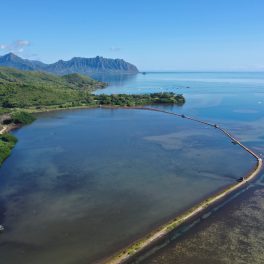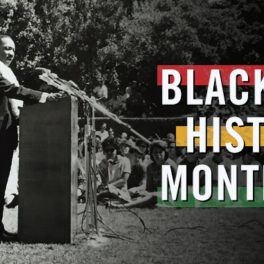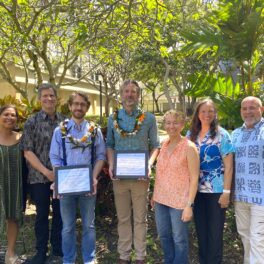Chip Fletcher

-
Interim DeanDEAN
-
ProfessorEARTH
Contact Info
- Email(s):
- fletcher@soest.hawaii.edu
- Telephone(s):
- (808) 956-6182 (office) (808) 956-5512 (fax) (808) 294-0386 (cell)
- Office(s):
- POST802A
- Website(s):
- https://www.soest.hawaii.edu/crc/
- Online Opinions: www.civilbeat.org/author/chip-fletcher/
- Welcome to SOEST!
Dr. Charles “Chip” Fletcher is the Interim Dean of the School of Ocean and Earth Science and Technology (SOEST), University of Hawai‘i at Mānoa. He is the former Chairperson of the Honolulu Climate Change Commission, a prominent public speaker, and contributor to local and national media.
Chip’s research and teaching focus on Climate Change, Coastal Community Resiliency, and Natural Coastal Systems. He has been principal advisor in funding and awarding over 30 graduate research degrees in Earth and Planetary Sciences, and has received a number of teaching, research, and community service awards.
- 2001 – University of Hawaii Board of Regents, Robert W. Clopton Award for Distinguished Community Service
- 2006 – University of Hawaii Board of Regents, Hung Wo and Elizabeth Lau Ching Foundation Award for Faculty Service
- 2011 – U.S. Environmental Protection Agency Environmental Achievement Award in Climate Change Science
- 2018 – Pacific Risk Management Ohana (PRiMO), Leadership Award
- 2018 – Hawai‘i Chapter of the Surfrider Foundation, Lifetime Achievement Award
- 2019 – Think Tech Hawai‘i, Community Service Award
The results of his work are used by government agencies for administering coastal policy, establishing construction guidelines, and planning resilient infrastructure projects. Data produced by his research team is used by Kaua‘i and Maui counties in their setback ordinance, and is considered in permit decisions by the City of Honolulu and the Hawai‘i Department of Land and Natural Resources.
With his students, Dr. Fletcher has published over 100 peer-reviewed articles as well as three textbooks.
- Living on the Shores of Hawaii: Natural Hazards, the Environment, and Our Communities, (2011, University of Hawai’i Press);
- Climate Change: What the Science Tells Us 2nd Edition (2019, J. Wiley & Sons);
- Physical Geology: The Science of Earth 3rd Edition (2017, J. Wiley & Sons).
Fletcher’s team has modeled the impacts of sea level rise (coastal erosion, seasonal [non-storm] wave overtopping, and hydrostatic flooding) for years 2030, 2050, 2075, & 2100, as set forth in IPCC AR5 RCP8.5. Modeling of urban flooding depicts risk from groundwater inundation, storm drain back-flow, and direct marine flooding. The widespread practice of shoreline hardening in Hawai‘i and globally, leads to beach loss as shown in these publications: beach loss, failure to protect, and his original paper in 1997.
Chip and his students have studied myriad topics related to the Hawai‘i coastal zone, including: Holocene sea level history, reef accretion, carbonate sedimentology, beach processes, paleoclimate, shoreline change, cultural assets, hydrostatic flooding, and coastal wetlands.
Download his CV.




